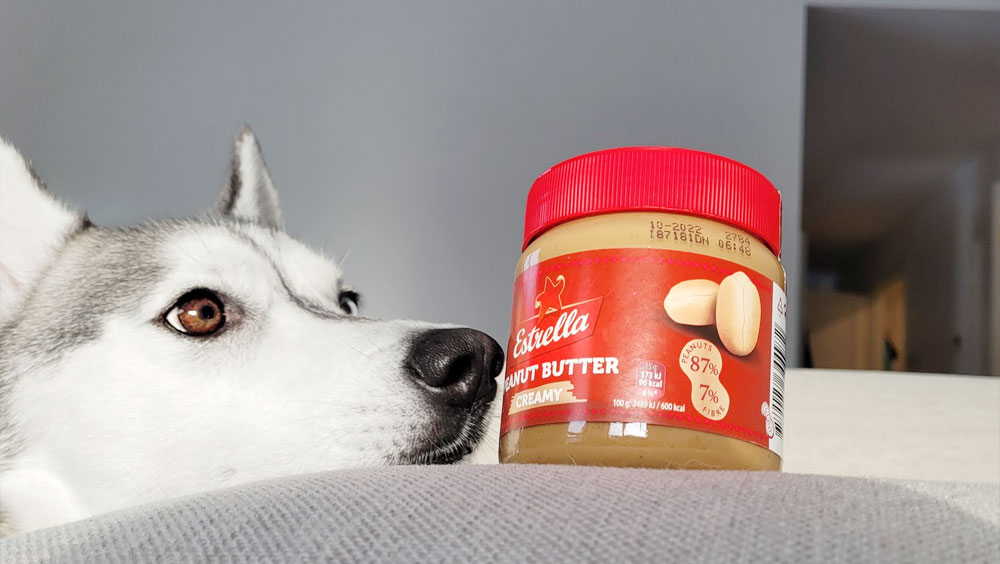Dogs are known for their love of treats, and one of their favorite snacks is peanut butter. But have you ever wondered why dogs go crazy for this sticky spread? There are many reasons why dogs love peanut butter, and it's not just because of its delicious taste. In this article, we will explore the benefits of peanut butter for dogs, what makes peanut butter so appealing to our furry friends, and how to safely incorporate this tasty treat into your dog's diet. So whether you're a dog owner looking for a new treat to give your pup, or just curious about why dogs love peanut butter, read on to discover the answers.
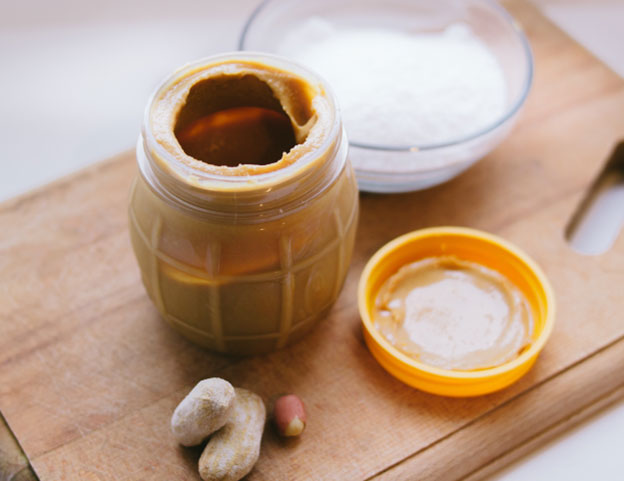
The Science Behind the Obsession
Dogs love peanut butter, and it's not just because of the delicious taste! There is actually science behind their obsession.
Firstly, the smell of peanut butter is irresistible to dogs. Their sense of smell is much stronger than ours, and the roasted aroma of peanut butter is highly enticing to them. This strong smell is due to the high-fat content and nutrient-rich nature of peanut butter.
Speaking of nutrients, peanut butter is an excellent source of protein and healthy fats. Dogs, just like humans, require these essential nutrients to maintain a healthy diet. Every tablespoon of peanut butter contains approximately 8 grams of protein, which is fantastic for furry friends who may not be getting enough protein in their regular food items.
But why does peanut butter have such a special place in dogs' hearts (or mouths, rather)? The answer is dopamine. Dopamine is a neurotransmitter that plays a crucial role in dogs' pleasure centers. By licking and consuming peanut butter, dogs are actually releasing dopamine, which makes them feel good and creates a positive association with the tasty treat.
It's important to note, however, that not all peanut butter is created equal. Some brands of peanut butter contain artificial sweeteners or extra sugar, which can cause a drop in blood sugar levels and lead to liver failure or hepatic necrosis over time. Always check ingredient labels and avoid peanut butter with toxic ingredients.
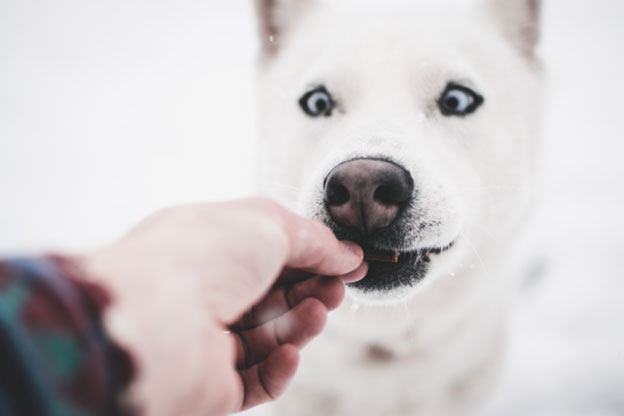
So, when it comes to giving your furry friend a special treat, peanut butter can be an excellent choice. Whether it's a homemade peanut butter treat or a spoonful of organic peanut butter straight from the jar, dogs can enjoy the delicious taste and health benefits of this nut butter. Just be sure to opt for unsalted and natural peanut butter to avoid any negative health effects.
Health Benefits and Risks
Peanut butter is a nutrient-rich food that provides dogs with a variety of essential vitamins and minerals. For example, peanut butter is an excellent source of protein, which helps dogs maintain muscle mass and promotes healthy growth and development. Moreover, peanut butter is high in healthy fats, such as omega-3 and omega-6, which are important for maintaining a healthy coat and skin.
Additionally, peanut butter contains vitamins B and E, which help strengthen the immune system and promote healthy brain function. Peanut butter is also a great source of fiber, which can improve digestion and regulate bowel movements. All in all, feeding your dog peanut butter as an occasional treat can provide them with many health benefits.
Risks of Feeding Peanut Butter to Dogs:
While dogs eating peanut butter can be beneficial in moderation, it's important to be aware of the potential risks. Many brands of processed peanut butter contain salt and sugar, which can be harmful to dogs if consumed in large quantities. Moreover, some peanut butter contains xylitol, an artificial sweetener that is highly toxic to dogs and can cause seizures, liver failure, and even death.
Another potential risk of feeding peanut butter to dogs is the possibility of developing allergies. While peanut butter isn't a common allergen for dogs, some dogs may have a sensitivity or allergy to peanuts, which could lead to symptoms such as itching, swelling, or difficulty breathing.
Importance of Moderation and Quality:
The key to feeding your dog peanut butter is moderation and quality. When selecting a peanut butter to give to your furry friend, look for natural peanut butter without added sugars or artificial sweeteners. Make sure to check the ingredient labels thoroughly and avoid any peanut butter containing xylitol.
It's also important to serve peanut butter in moderation. While it can be a tasty and nutritious treat for dogs, too much peanut butter can lead to weight gain and other health issues. Limit peanut butter to occasional treats or as a supplement to their regular diet. By maintaining proper moderation and selecting high-quality peanut butter, you can ensure that your furry friend can safely enjoy the many health benefits of peanut butter.
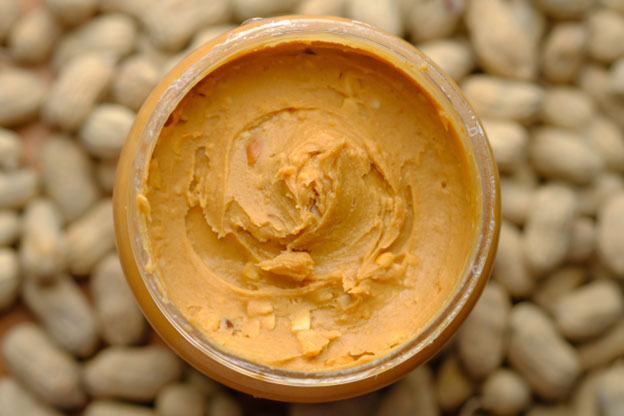
Fun and Safe Ways to Enjoy Peanut Butter with Your Dog
Are you looking for fun and safe ways to enjoy peanut butter with your furry friend? Look no further! There are many ways to incorporate peanut butter into your dog's diet and playtime.
1. Homemade Peanut Butter Treats:
Making homemade peanut butter treats is a great way to provide your dog with a delicious and healthy snack. Simply mix natural peanut butter with rolled oats, honey, and mashed sweet potato, and bake in the oven until golden brown. Your dog will love the crunchy texture and roasted aroma to satisfy its sweet tooth.
2. Peanut Butter Stuffed Toys:
Peanut butter stuffed toys are a great way to keep your dog entertained and mentally stimulated. Simply stuff a KONG toy or a similar treat-dispensing toy with natural, unsalted peanut butter and freeze it overnight. The next day, give your dog the toy and watch as they playfully try to extract the peanut butter. Not only is this a fun activity, but it also helps keep your dog's teeth clean by promoting healthy chewing.
3. Precautions to take when giving Peanut Butter to Dogs:
While peanut butter can be a healthy and enjoyable treat for dogs, it's important to take certain precautions to ensure their safety. Avoid peanut butter brands that contain xylitol, an artificial sweetener that can be toxic to dogs. Also, be mindful of the fat and calorie content in peanut butter and adjust your dog's caloric intake accordingly. Lastly, always supervise your dog when they are enjoying peanut butter to prevent any choking hazards or accidental ingestion of toxic ingredients.
In conclusion, incorporating peanut butter into your dog's diet and playtime can provide many health benefits and enjoyment as long as precautions are taken. Try out these fun and safe ways to enjoy peanut butter with your furry friend today!
Frequently Asked Questions:
Frequently Asked Questions About Dogs and Peanut Butter:
Is peanut butter safe for all dogs?
In general, peanut butter is safe for most dogs to consume. However, it's important to check the ingredient labels and avoid brands that include any toxic ingredients, such as xylitol. It's also important to monitor your dog's caloric intake and adjust as necessary to prevent weight gain. Additionally, some dogs may have allergies to peanuts, so it's recommended to introduce eating peanut butter gradually and watch for any signs of an allergic reaction.
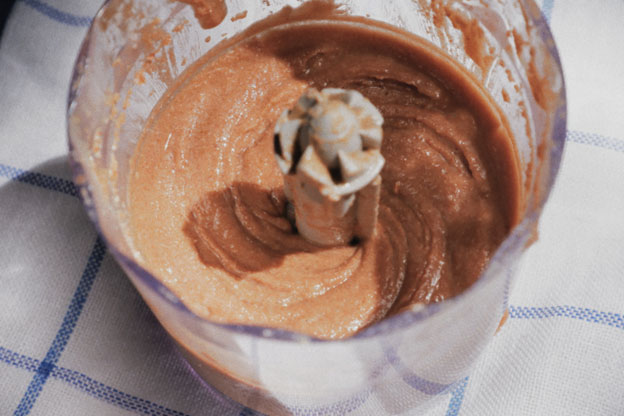
Can peanut butter be used as a training tool?
Yes, peanut butter can be a great tool for training your dog. Many dogs find the taste and smell of peanut butter irresistible, making it an excellent motivator for obedience training and other commands. Simply offer a small amount of peanut butter as a reward for good behavior or for successfully performing a task. Be sure to adjust your dog's overall diet to account for the extra calories from the peanut butter treats.
Are there any alternatives to peanut butter for dogs?
Yes, there are several alternatives to peanut butter that can be used as a treat or training tool for dogs. Some dogs enjoy the taste and texture of other nut butter, such as almond butter or cashew butter. Additionally, there are specialized dog treats and chews available on the market that offer similar benefits to peanut butter. If your dog has a particular flavor preference, such as salmon or chicken, you may also want to consider those options. Be sure to check the ingredient label and adjust your dog's diet as necessary.

